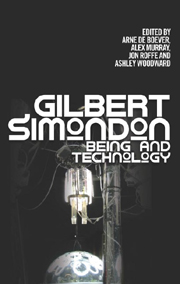Book contents
- Frontmatter
- Contents
- Abbreviations
- Editors' Introduction: Simondon, Finally
- 1 Technical Mentality
- Explications
- Implications
- 5 The Question of Anxiety in Gilbert Simondon
- 6 Infra-Psychic Individualization: Transductive Connections and the Genesis of Living Techniques
- 7 ‘Du mort qui saisit le vif’: Simondonian Ontology Today
- 8 The Aesthetics of Gilbert Simondon: Anticipation of the Contemporary Aesthetic Experience
- Resonances
- Glossary: Fifty Key Terms in the Works of Gilbert Simondon
- Notes on Contributors
- Index
5 - The Question of Anxiety in Gilbert Simondon
from Implications
Published online by Cambridge University Press: 12 September 2012
- Frontmatter
- Contents
- Abbreviations
- Editors' Introduction: Simondon, Finally
- 1 Technical Mentality
- Explications
- Implications
- 5 The Question of Anxiety in Gilbert Simondon
- 6 Infra-Psychic Individualization: Transductive Connections and the Genesis of Living Techniques
- 7 ‘Du mort qui saisit le vif’: Simondonian Ontology Today
- 8 The Aesthetics of Gilbert Simondon: Anticipation of the Contemporary Aesthetic Experience
- Resonances
- Glossary: Fifty Key Terms in the Works of Gilbert Simondon
- Notes on Contributors
- Index
Summary
The question of anxiety occupies a singular position in the process of psycho-collective individuation in three regards. It marks, first of all, the threshold of this process, designating the problematic moment at which the subject feels the necessity to pursue its individuation without yet becoming its operator. Anxiety constitutes here a state of blockage for the individual, who is invaded by the charge of pre-individual nature but who is rendered incapable of being individuated in the collective; conscious of being more than an individual, the anxious being has none the less not yet become a transindividual personality. As is the case with every threshold phenomenon, anxiety provides a particularly incisive point of view on the two aspects that it separates and articulates – the psychic subject and the transindividual dimension – and simultaneously casts light on the logic of psychic and collective individuation. For the same reasons, the question of anxiety signals, second, the constitutive ambiguity of the concept of the transindividual in Simondon. Indeed, the transindividual is at once immanent and transcendent to the individual, the condition of the individuation of the subject and the accomplishment of a spirituality, both a given and a result. The decisive concept of the second part of Simondon's main thesis (L'Individuation psychique et collective) – the transindividual – is confronted there with certain major difficulties: far from being a contradiction or an incoherence in Simondon's thought, we will see that this ambiguity is in fact of central interest.
- Type
- Chapter
- Information
- Gilbert SimondonBeing and Technology, pp. 73 - 91Publisher: Edinburgh University PressPrint publication year: 2012



